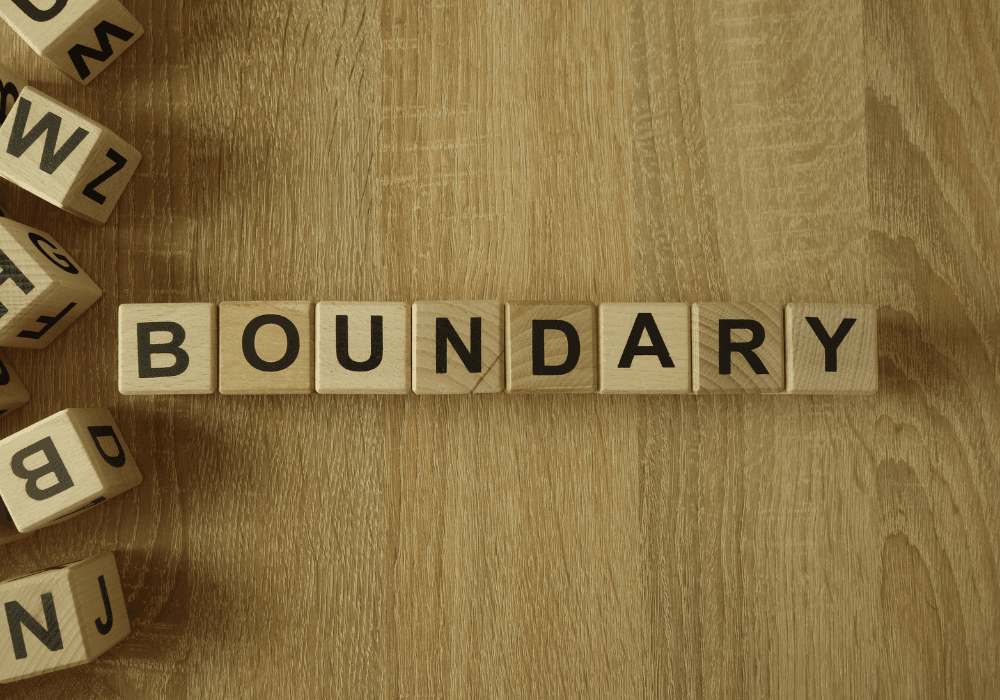Boundaries do not repel individuals; they instruct them on how to show respect toward you.
Relationships—romantic, familial, or friendships—are at the core of human life. We thrive because of our relationships, shared experiences, and emotional support. Without relationships, life would feel empty, lonely, and lacking purpose. However, when we overlook setting boundaries in relationships, they can become overwhelming, suffocating, or even toxic, despite their beauty and fulfillment.
Boundaries are often misunderstood. Some people see them as barriers, as if setting limits means creating distance or being selfish. In reality, setting boundaries in relationships is an act of self-respect and mutual understanding—they allow people to feel secure, valued, and emotionally safe in their relationships.
When relationships lack healthy boundaries, individuals may feel pressured to meet unrealistic expectations, lose their freedom, or even experience emotional manipulation. Cultural norms and societal expectations often dictate how people “should” behave in relationships, sometimes forcing them to ignore their needs for the sake of others. However, strong relationships are indeed built not on sacrifice but on mutual respect, communication, and individuality.
This article explores what personal boundaries are, why they are essential, and how to set boundaries in different areas of life—including work, family, and friendships—so you can maintain your relationships without losing yourself.
Personal boundaries are invisible guidelines that define what is acceptable and unacceptable in your interactions with others. They are emotional, mental, and sometimes physical limits that help protect your well-being. Think of them as the protective walls of a house—without them, anyone could enter at any time, take what they want, and leave you feeling drained and exposed.
What is the definition of boundaries in a relationship?
Boundaries in a relationship are the personal limits that define how individuals expect to be treated, ensuring mutual respect, emotional security, and personal well-being. They help maintain a healthy balance between closeness and individuality, preventing misunderstandings, emotional exhaustion, or control. Setting clear boundaries allows partners, friends, or family members to communicate openly, respect each other’s needs, and build a stronger, more fulfilling connection without sacrificing their identity or happiness.
Setting Boundaries in Relationships
The truth is, without boundaries, relationships can drain you. Even the most loving relationship can become overwhelming if there is no balance. Setting boundaries is a form of self-care, and here’s why:

Preserve Your Self-Identity
In relationships, it’s easy to become so invested in another person’s needs, emotions, and expectations that you gradually start losing sight of who you truly are. This is especially common in close relationships—romantic, familial, or friendships—where the desire to be liked, accepted, or loved can lead to self-sacrifice at the cost of personal identity.
Have you ever found yourself saying yes to things you would rather not do, just to avoid disappointing someone? Have you ever changed your personality, opinions, or preferences to align with those around you? If so, it’s a sign that your boundaries may need strengthening.
Boundaries act as anchors, keeping you rooted in your authentic self. They allow you to:
- Express your personal opinions without fear of rejection.
- Maintain your hobbies, dreams, and passions even when in a relationship.
- Avoid becoming emotionally dependent on others for happiness.
- Make decisions based on your values and needs, not just what others expect from you.
When you don’t have boundaries, you may start living for others instead of yourself, which can lead to resentment, unhappiness, and even an identity crisis. Setting boundaries isn’t about shutting people out—it’s about staying true to who you are while still being a loving, supportive presence in your relationships.
Prevent Emotional Burnout
Imagine constantly running a marathon without stopping for water. That’s what it feels like when you keep giving to others without taking time to recharge. Emotional burnout happens when we spend too much energy meeting other people’s needs while neglecting our own.
This is particularly true for people-pleasers, empaths, and caregivers, who often feel a deep responsibility to always be available, supportive, and accommodating. But without boundaries, this kind of selflessness can quickly lead to:
- I am experiencing chronic stress and fatigue due to overcommitting to others.
- The burden of other people’s problems drains us emotionally.
- Relationships become a burden rather than a source of joy, leading to a loss of joy.
Boundaries help prevent burnout by teaching you to:
✔ Prioritize your well-being without guilt.
✔ Recognize that you cannot pour from an empty cup—taking care of yourself allows you to better support others.
✔ Say “no” when needed, knowing that rest is not selfish; it’s necessary.
By setting limits on how much energy you give away, you reclaim control over your emotional health. This enables you to present yourself fully and authentically in relationships, instead of constantly feeling depleted.
Encourage Mutual Respect

Respect is the foundation of any healthy relationship, and boundaries play a crucial role in establishing it. People who truly care about you will honor your boundaries because they respect your needs, just as you respect theirs.
However, when you start setting boundaries, some people may react negatively. Why? They benefited from your lack of boundaries. They might have been accustomed to:
- You have unrestricted access to your time and energy without taking into account your needs.
- I am relying on you to always say yes, even when it inconveniences you.
- They assumed that their expectations would always come first.
When you enforce a boundary and someone gets upset, it doesn’t mean you’re doing something wrong—it means you’re breaking an unhealthy pattern. A person who values and respects you will adjust and understand that boundaries are necessary for a balanced, respectful relationship.
Boundaries help you see who respects you and who only values you when it’s convenient. Those who care about you will respect your limits; those who don’t may try to manipulate, guilt-trip, or ignore them.
By standing firm in your boundaries, you teach people how to treat you with the respect and consideration you deserve.
Reduce Conflict and Resentment
A large percentage of relationship conflicts arise from unspoken expectations. When boundaries are unclear, one person may assume that their needs should automatically be met, while the other person may silently struggle with feeling overwhelmed or unheard.
For example:
- A friend may assume you’re always available to listen to their problems, but you secretly feel drained by the emotional burden.
- A partner may expect you to handle all household responsibilities, not realizing you need equal participation.
- A co-worker may consistently ask for your help, assuming you don’t mind, while you feel frustrated at being taken advantage of.
Without clear boundaries, these issues remain unresolved, leading to growing resentment, frustration, and emotional exhaustion. Over time, resentment can damage a relationship more than the initial conflict itself.
When you set clear boundaries, you eliminate assumptions and communicate expectations openly. Such communication prevents small annoyances from escalating into major relationship rifts. It also helps both parties feel secure, valued, and understood.
Healthy relationships aren’t about avoiding conflict altogether—they’re about handling differences with respect and understanding. Boundaries help create an environment where open communication and emotional balance are the norm, not the exception.
Enhance Emotional Security
One of the biggest benefits of setting boundaries is the sense of emotional security they bring to relationships. When you know where you stand, relationships feel stable, predictable, and safe.
Consider the difference between a relationship with clear, mutual boundaries and one without them:
- Without Boundaries:
- You feel unsure about what is acceptable and what isn’t.
- People fear taking advantage of them or going over their limits.
- You may feel anxiety over saying “no” or expressing your true feelings.
- With Boundaries:
- You feel safe to express your needs without fear of judgment.
- The relationship has clear expectations, which reduces misunderstandings.
- Both individuals feel valued and respected, leading to deeper emotional trust.
Boundaries eliminate uncertainty by making it clear what is acceptable and what is not. This fosters a sense of emotional safety, trust, and stability, allowing relationships to grow in a way that is healthy and fulfilling for both parties.
Knowing what to expect from each other allows people to navigate the relationship with confidence and security, instead of constantly feeling uncertain or cautious.
Overstepping Boundaries In A Relationship

Overstepping boundaries in a relationship occurs when one person disregards or ignores the personal limits set by their partner, friend, or family member. This behavior can manifest in various ways, such as invading personal space, emotional manipulation, excessive control, or dismissing feelings and needs. Repeatedly crossing boundaries can lead to resentment, trust loss, and emotional exhaustion, which can make the relationship feel overwhelming or even toxic. Healthy relationships thrive on mutual respect, open communication, and a clear understanding of personal limits, ensuring that both individuals feel valued, safe, and emotionally secure.
How to Stop Overstepping Boundaries in a Relationship
Recognize the Signs—Pay attention to when your partner, friend, or family member seems uncomfortable, withdrawn, or frustrated.
Respect Personal Space—Give them the physical and emotional space they need without making them feel guilty.
Listen and Acknowledge—If someone expresses a boundary, respect it instead of dismissing or challenging it.
Communicate Openly—Ask about their needs and expectations instead of assuming what they want.
Avoid Controlling Behavior—Let your partner or friend make their own choices instead of pressuring them into doing things your way.
Check Your Intentions—Make sure your actions come from care and respect, not from a need to control, fix, or invade personal privacy.
Apologize and Adjust—If you realize you’ve overstepped a boundary, acknowledge it, apologize, and change your behavior moving forward.
Encourage Mutual Boundaries—Ensure both individuals have the freedom to express and enforce their boundaries without fear of conflict or rejection.
Misunderstandings About Boundaries
A common mistake people make is thinking that boundaries are about controlling others. In reality, boundaries have nothing to do with forcing someone else to behave in a certain way. Instead, they are about taking responsibility for your well-being by defining what is acceptable and unacceptable in your life.
Boundaries are an act of self-respect, not manipulation or rejection. Despite the importance of boundaries, many people hesitate to establish them due to deeply ingrained fears and misconceptions”. Let’s clarify and challenge some of the most widespread misconceptions.
Boundaries Are Selfish
Many people believe that setting boundaries means they are being self-centered, unkind, or inconsiderate. This belief is particularly common among people-pleasers, who feel responsible for ensuring everyone around them is happy, even at the cost of their well-being. However, the truth is that boundaries are the opposite of selfishness. They allow you to protect your mental and emotional energy, so when you do give, you’re doing it out of genuine care, not resentment, exhaustion, or guilt.
If I Set Boundaries, I’ll Lose People
This is one of the biggest fears people have when setting boundaries—the fear of losing relationships. However, the reality is that healthy relationships thrive on mutual respect, and boundaries are a key part of that respect.
If someone gets angry, defensive, or manipulative when you set a boundary, it likely means that they were benefiting from you not having one. They may have enjoyed unlimited access to your time, energy, or resources without considering your well-being.
Setting Boundaries Means I Don’t Care About Others
Some people equate setting boundaries with being cold, distant, or uncaring. But in reality, boundaries create healthier, more authentic connections.
Think about it—when you constantly say “yes” to things you would rather not do, resentment builds up over time. You may start feeling used, frustrated, or even angry, which can damage the relationship far more than an honest boundary ever could.
Boundaries help maintain emotional balance and ensure that when you give, you’re doing so willingly and happily, rather than out of obligation or fear. This leads to:
✔ More open communication.
✔ Fewer misunderstandings.
✔ Stronger emotional security.
Setting boundaries doesn’t mean you stop caring about others—it means you are making space to care for yourself while still showing up for the people who matter in your life.
Boundaries Mean Cutting People Off
Some people believe that setting boundaries is the same as shutting people out completely, but this is a misunderstanding. Boundaries are not walls designed to keep people away; they are guidelines that define how you want to be treated.
Boundaries allow you to maintain relationships in a way that feels healthy, balanced, and sustainable. The goal is not to push people away but to ensure that interactions remain respectful and mutually fulfilling.
Once I Set a Boundary, It Should Always Be the Same
Some people assume that once they set a boundary, it should be fixed forever. However, boundaries are not rigid laws—they are flexible and adaptable based on your personal growth and changing circumstances.
It’s important to regularly reassess your boundaries and adjust them based on what feels right for you. Growth, healing, and life changes all influence how you feel safe and respected in your relationships.


